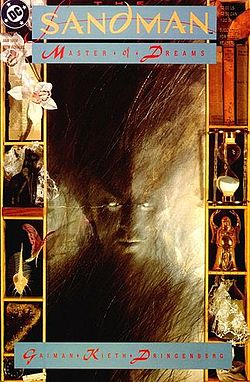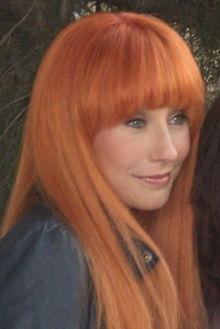Five Things You Might Not Know About Neil Gaiman
This article relates to The Ocean at the End of the Lane

 Before he began to write novels that would earn him public recognition, Gaiman wrote comic books and graphic novels. The Sandman graphic novels (1989-1996), initially published by D C Comics and later by Vertigo, were particularly popular with a total of 75 issues. The Sandman is about an all-powerful being called Dream, also named Morpheus. He is one of seven god-like siblings who have always existed, and who exert their influence on our world. The series follows Morpheus, who has been the prisoner of a group of wizards for 70 years. Once he escapes, he must find several powerful objects that will allow him to exact revenge upon his enemies. Along the way he must also face up to his mistakes, and find a way to reclaim his kingdom of dreams.
Norman Mailer once described The Sandman as "a comic strip for intellectuals." Among its many awards it was included in Entertainment Weekly's list of 100 best reads from 1983 to 2008, and issue 19 won a World Fantasy Award for Best Short Fiction in 1999 (the only graphic novel to have ever won the award). It is also one of a very few graphic novels to have been on The New York Times bestseller list.
Before he began to write novels that would earn him public recognition, Gaiman wrote comic books and graphic novels. The Sandman graphic novels (1989-1996), initially published by D C Comics and later by Vertigo, were particularly popular with a total of 75 issues. The Sandman is about an all-powerful being called Dream, also named Morpheus. He is one of seven god-like siblings who have always existed, and who exert their influence on our world. The series follows Morpheus, who has been the prisoner of a group of wizards for 70 years. Once he escapes, he must find several powerful objects that will allow him to exact revenge upon his enemies. Along the way he must also face up to his mistakes, and find a way to reclaim his kingdom of dreams.
Norman Mailer once described The Sandman as "a comic strip for intellectuals." Among its many awards it was included in Entertainment Weekly's list of 100 best reads from 1983 to 2008, and issue 19 won a World Fantasy Award for Best Short Fiction in 1999 (the only graphic novel to have ever won the award). It is also one of a very few graphic novels to have been on The New York Times bestseller list.
Although Issue #75 was to mark the end of the series, many mini-series and one-off publications related to The Sandman have been published since, most not written by Gaiman. However, in July 2012 Gaiman announced that he had one untold story to tell - a prequel to the series explaining how Morpheus came to be captured. In late June 2013, it was announced that The Sandman: Overture will be published in six monthly issues beginning Oct 30, 2013, with art by J.H. Williams III.
- Gaiman has family ties to the Church of Scientology. His childhood religious upbringing was quite unusual; his Jewish great-grandfather immigrated from Poland to England in the early 1900s, and his immediate (and extended) family were practicing Jews until Gaiman was around 4 years old. That was when his parents became interested in Scientology. When Neil was five the family moved to East Grinstead, where the UK headquarters of Scientology is located. His parents studied Dianetics (a set of metaphysical ideas and practices created by L Ron Hubbard, the founder of Scientology), and raised their children in the Church of Scientology, while continuing to uphold observations of Jewish faith. Gaiman commented, in a BBC-TV interview (Meet the Author, June 17, 2013), that during this time he was also attending a grammar school run by the Church of England. He indicates that it was not confusing, but that it gave him many traditions to draw from.
Apparently, his mother (who was a pharmacist) opened a shop that specialized in Scientology-endorsed supplements and health regimens and his father began working for the Scientology organization doing public relations. A BBC interview was conducted with Neil at age 7 (available only in transcript), in which he tried to explain what he was learning as a young Scientologist. The intricacies of Scientology are hard to understand if you have not been educated in it, and poor Neil seemed to have had a hard time explaining it. Nevertheless, the transcript is said to have been used as a publicity tool by the Church of Scientology. Gaiman's father continued to rise in the hierarchy of the organization until his death in 2009 and, according to many reports, Gaiman's sisters are still Scientologists, as is Gaiman's first wife, Mary McGrath (more about McGrath below). Gaiman himself does not like to talk about his religious beliefs, although he has been clear in saying he is not a Scientologist.
 On January 1, 2011, Neil Gaiman married musician and performer Amanda Palmer; it was his second marriage. They were introduced by a mutual friend, but because of their touring schedules, their first few "dates" consisted of two or three-day meet-ups in different countries where their schedules happened to intersect. Gaiman has discussed a few of the details of their courtship and nuptials in interviews, but for a more comprehensive (and R-rated) version you can check out Palmer's "The Wedding Blog" on her official site.
On January 1, 2011, Neil Gaiman married musician and performer Amanda Palmer; it was his second marriage. They were introduced by a mutual friend, but because of their touring schedules, their first few "dates" consisted of two or three-day meet-ups in different countries where their schedules happened to intersect. Gaiman has discussed a few of the details of their courtship and nuptials in interviews, but for a more comprehensive (and R-rated) version you can check out Palmer's "The Wedding Blog" on her official site.
Amanda Palmer is edgy, outspoken, and more a "performance artist" than simply a singer and piano player. She is perhaps best known for her work as the female half of the punk cabaret duo, The Dresden Dolls, but she also made news in 2012 when she used a Kickstarter campaign to fund a new album. The campaign raised $1.2 million dollars, and was the highest earning Kickstarter music project at the time.
Gaiman's first wife was Mary McGrath, with whom he has three children, now grown. They were married in 1985, and had already been separated for about three years before the marriage ended in 2008, but Gaiman says that they are good friends. Their homes are also reportedly near one another because he wanted to maintain a relationship with her and his in-laws, for the sake of their children.
 One of Gaiman's closest friends is singer/songwriter Tori Amos. Before she ever met him, she had written a line about him in her song, "Tear in Your Hand," off of her first commercially successful album: Little Earthquakes: "If you need me, me and Neil'll be hanging out with the Dream King/Neil says hi, by the way." When he was signing autographs at an event, a friend of Tori's slipped him a tape containing that song and several others, along with a card that provided her address. After hearing it, he was so impressed that he wrote her a fan letter. That began the friendship. Amos would go on to reference Gaiman or his fictional characters in several other songs. In turn, he began altering the appearance of one of his Sandman characters (Delirium) until she clearly resembled Amos. He also began incorporated lyrics from her songs, and even things she said to them when they were visiting, into Delirium's dialogue. His children's book, Blueberry Girl (2009) is based on a poem that Gaiman wrote for Tori's daughter, Tash, (who is Gaiman's goddaughter). You can view the book trailer below with an audio recording of the poem read by Gaiman.
One of Gaiman's closest friends is singer/songwriter Tori Amos. Before she ever met him, she had written a line about him in her song, "Tear in Your Hand," off of her first commercially successful album: Little Earthquakes: "If you need me, me and Neil'll be hanging out with the Dream King/Neil says hi, by the way." When he was signing autographs at an event, a friend of Tori's slipped him a tape containing that song and several others, along with a card that provided her address. After hearing it, he was so impressed that he wrote her a fan letter. That began the friendship. Amos would go on to reference Gaiman or his fictional characters in several other songs. In turn, he began altering the appearance of one of his Sandman characters (Delirium) until she clearly resembled Amos. He also began incorporated lyrics from her songs, and even things she said to them when they were visiting, into Delirium's dialogue. His children's book, Blueberry Girl (2009) is based on a poem that Gaiman wrote for Tori's daughter, Tash, (who is Gaiman's goddaughter). You can view the book trailer below with an audio recording of the poem read by Gaiman.
In expressing their admiration for one another, Neil has said of Tori, "I think she's absolutely magic," and Tori has said of Neil: "I think he's probably the most important writer right now. There's no question that Neil is in another league."
- In addition to writing novels for children and adults, Gaiman has been involved in feature films and television. Here are some of his credits:
- The screenplay for the 1996 BBC series Neverwhere, based upon his book of the same name.
- The script for an episode of Babylon 5 ("Day of the Dead," Season 5, 1998).
- The script for an episode of the long-running BBC series Doctor Who: "The Doctor's Wife" (Season 6, 2011).
- Co-writer of the film script for Beowulf, starring Crispin Glover (2007)
- Producer of Stardust (2007), based upon his book of that name.
- the movie Coraline (2009) was based on the book of the same name by Gaiman.
- Two more Gaiman books are currently being adapted for the screen: American Gods , and The Graveyard Book, possibly slated as television series, with dates for both, as of June 2014, unclear.
Images:
Cover of The Sandman #1, January 1989
Amanda Palmer
Tori Amos
Filed under Books and Authors
 This "beyond the book article" relates to The Ocean at the End of the Lane. It originally ran in July 2013 and has been updated for the
June 2014 paperback edition.
Go to magazine.
This "beyond the book article" relates to The Ocean at the End of the Lane. It originally ran in July 2013 and has been updated for the
June 2014 paperback edition.
Go to magazine.
Membership Advantages
- Reviews
- "Beyond the Book" articles
- Free books to read and review (US only)
- Find books by time period, setting & theme
- Read-alike suggestions by book and author
- Book club discussions
- and much more!
-
Just $60 for 12 months or
$20 for 3 months.
- More about membership!

 Before he began to write novels that would earn him public recognition, Gaiman wrote comic books and graphic novels. The Sandman graphic novels (1989-1996), initially published by D C Comics and later by Vertigo, were particularly popular with a total of 75 issues. The Sandman is about an all-powerful being called Dream, also named Morpheus. He is one of seven god-like siblings who have always existed, and who exert their influence on our world. The series follows Morpheus, who has been the prisoner of a group of wizards for 70 years. Once he escapes, he must find several powerful objects that will allow him to exact revenge upon his enemies. Along the way he must also face up to his mistakes, and find a way to reclaim his kingdom of dreams.
Norman Mailer once described The Sandman as "a comic strip for intellectuals." Among its many awards it was included in Entertainment Weekly's list of 100 best reads from 1983 to 2008, and issue 19 won a World Fantasy Award for Best Short Fiction in 1999 (the only graphic novel to have ever won the award). It is also one of a very few graphic novels to have been on The New York Times bestseller list.
Before he began to write novels that would earn him public recognition, Gaiman wrote comic books and graphic novels. The Sandman graphic novels (1989-1996), initially published by D C Comics and later by Vertigo, were particularly popular with a total of 75 issues. The Sandman is about an all-powerful being called Dream, also named Morpheus. He is one of seven god-like siblings who have always existed, and who exert their influence on our world. The series follows Morpheus, who has been the prisoner of a group of wizards for 70 years. Once he escapes, he must find several powerful objects that will allow him to exact revenge upon his enemies. Along the way he must also face up to his mistakes, and find a way to reclaim his kingdom of dreams.
Norman Mailer once described The Sandman as "a comic strip for intellectuals." Among its many awards it was included in Entertainment Weekly's list of 100 best reads from 1983 to 2008, and issue 19 won a World Fantasy Award for Best Short Fiction in 1999 (the only graphic novel to have ever won the award). It is also one of a very few graphic novels to have been on The New York Times bestseller list.  On January 1, 2011, Neil Gaiman married musician and performer Amanda Palmer; it was his second marriage. They were introduced by a mutual friend, but because of their touring schedules, their first few "dates" consisted of two or three-day meet-ups in different countries where their schedules happened to intersect. Gaiman has discussed a few of the details of their courtship and nuptials in interviews, but for a more comprehensive (and R-rated) version you can check out Palmer's "The Wedding Blog" on her official site.
On January 1, 2011, Neil Gaiman married musician and performer Amanda Palmer; it was his second marriage. They were introduced by a mutual friend, but because of their touring schedules, their first few "dates" consisted of two or three-day meet-ups in different countries where their schedules happened to intersect. Gaiman has discussed a few of the details of their courtship and nuptials in interviews, but for a more comprehensive (and R-rated) version you can check out Palmer's "The Wedding Blog" on her official site.  One of Gaiman's closest friends is singer/songwriter Tori Amos. Before she ever met him, she had written a line about him in her song, "Tear in Your Hand," off of her first commercially successful album: Little Earthquakes: "If you need me, me and Neil'll be hanging out with the Dream King/Neil says hi, by the way." When he was signing autographs at an event, a friend of Tori's slipped him a tape containing that song and several others, along with a card that provided her address. After hearing it, he was so impressed that he wrote her a fan letter. That began the friendship. Amos would go on to reference Gaiman or his fictional characters in several other songs. In turn, he began altering the appearance of one of his Sandman characters (Delirium) until she clearly resembled Amos. He also began incorporated lyrics from her songs, and even things she said to them when they were visiting, into Delirium's dialogue. His children's book, Blueberry Girl (2009) is based on a poem that Gaiman wrote for Tori's daughter, Tash, (who is Gaiman's goddaughter). You can view the book trailer below with an audio recording of the poem read by Gaiman.
One of Gaiman's closest friends is singer/songwriter Tori Amos. Before she ever met him, she had written a line about him in her song, "Tear in Your Hand," off of her first commercially successful album: Little Earthquakes: "If you need me, me and Neil'll be hanging out with the Dream King/Neil says hi, by the way." When he was signing autographs at an event, a friend of Tori's slipped him a tape containing that song and several others, along with a card that provided her address. After hearing it, he was so impressed that he wrote her a fan letter. That began the friendship. Amos would go on to reference Gaiman or his fictional characters in several other songs. In turn, he began altering the appearance of one of his Sandman characters (Delirium) until she clearly resembled Amos. He also began incorporated lyrics from her songs, and even things she said to them when they were visiting, into Delirium's dialogue. His children's book, Blueberry Girl (2009) is based on a poem that Gaiman wrote for Tori's daughter, Tash, (who is Gaiman's goddaughter). You can view the book trailer below with an audio recording of the poem read by Gaiman.![]() This "beyond the book article" relates to The Ocean at the End of the Lane. It originally ran in July 2013 and has been updated for the
June 2014 paperback edition.
Go to magazine.
This "beyond the book article" relates to The Ocean at the End of the Lane. It originally ran in July 2013 and has been updated for the
June 2014 paperback edition.
Go to magazine.